Dynamic Currency Conversion
Dynamic Currency Conversion (DCC) enables your international customers to choose to pay for their purchases, either in the merchant’s base currency or the currency of their issuing card. When displaying to the customer, the merchant or a third-party Currency Conversion Processor (CCP) provides the real-time interbank exchange rate of the transaction.
How it works
Maya, along with its merchants, offers Dynamic Currency Conversion (DCC) as a service, granting customers the flexibility to finalize their cross-border transactions in either the local merchant currency or their billing currency.
- If the customer opts to complete the transaction in the merchant’s local currency, the transaction amount will be converted using the exchange rate provided by their card issuer.
- If the customer chooses to complete the transaction in their card’s billing currency, their account will be debited using the exchange rate offered by Maya.
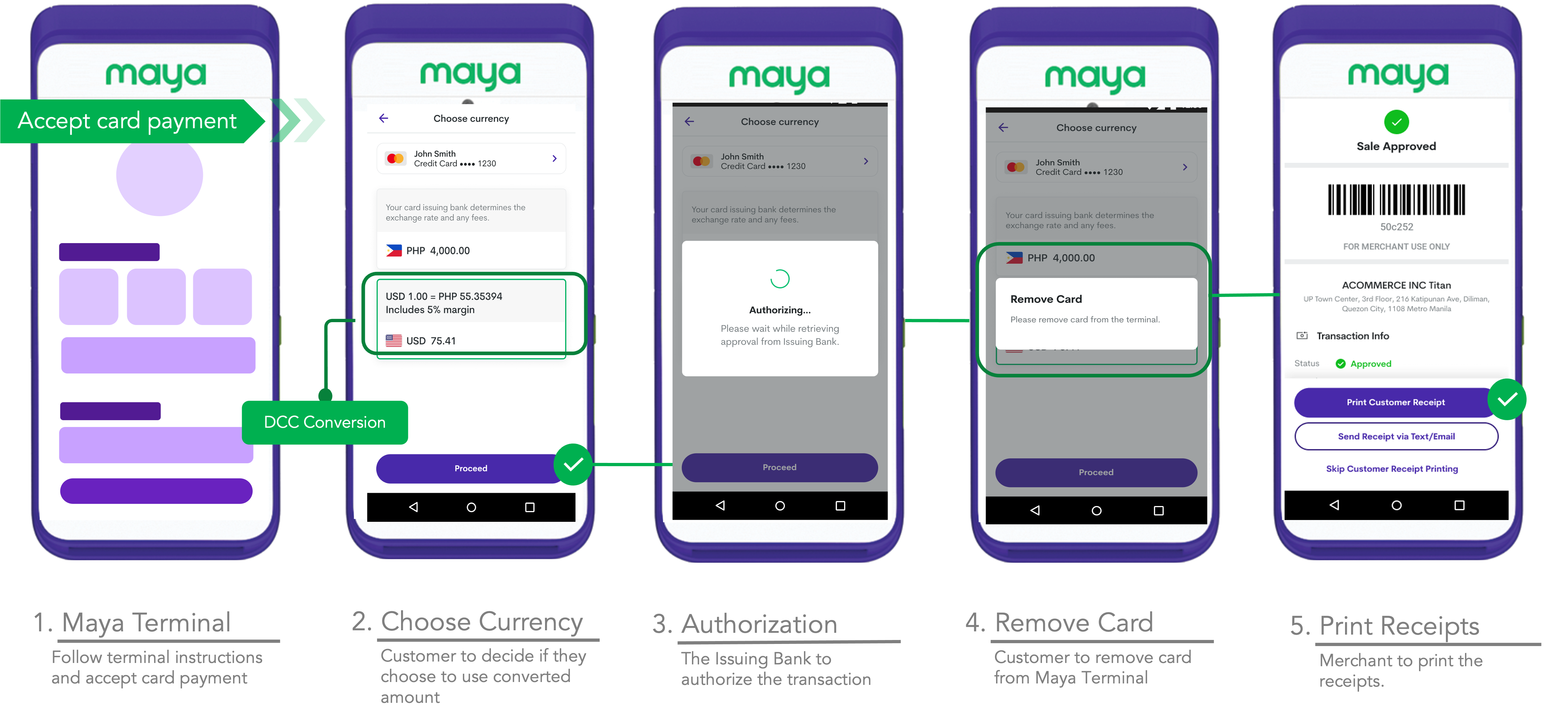
How to enable DCC
Contact your designated Maya Relationship Manager to:
- Enable and configure DCC to ensure it is offered in your store terminals.
- Enable DCC reporting for your merchant account(s). This will ensure reports and the Maya Manager dashboard reflect the DCC details.
New to Maya Business? Get your Maya Terminals here  .
.
DCC For Maya Stand-alone Terminals
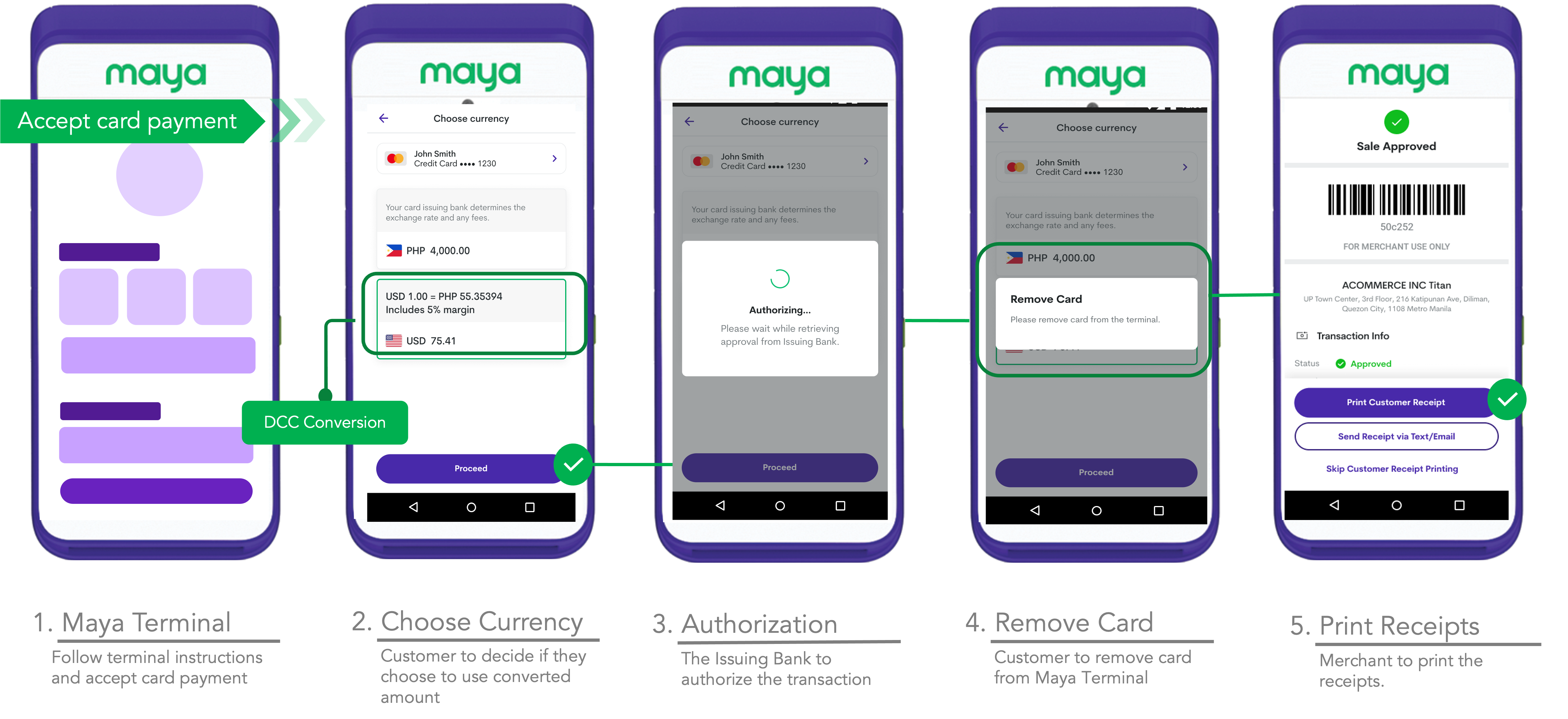
Click for more details
- Accept terminal payments
 as usual, and the customer presents the card to the Maya Terminal.
as usual, and the customer presents the card to the Maya Terminal. - The Maya terminal will recognize the country of the customer’s issued card.
- If the card’s currency differs from the merchant’s local currency, the Maya terminal will prompt the customer to choose between paying in the local currency or their own home currency.
- If the customer accepts DCC by choosing their issuing card’s currency, foreign exchange conversion and the markup will be applied to the transaction. The generated receipts from Maya should include this information. If the customer opts for the merchant’s local currency, the transaction continues in the local currency.
DCC for Authorization and Capture
Pre-authorize a DCC Transaction
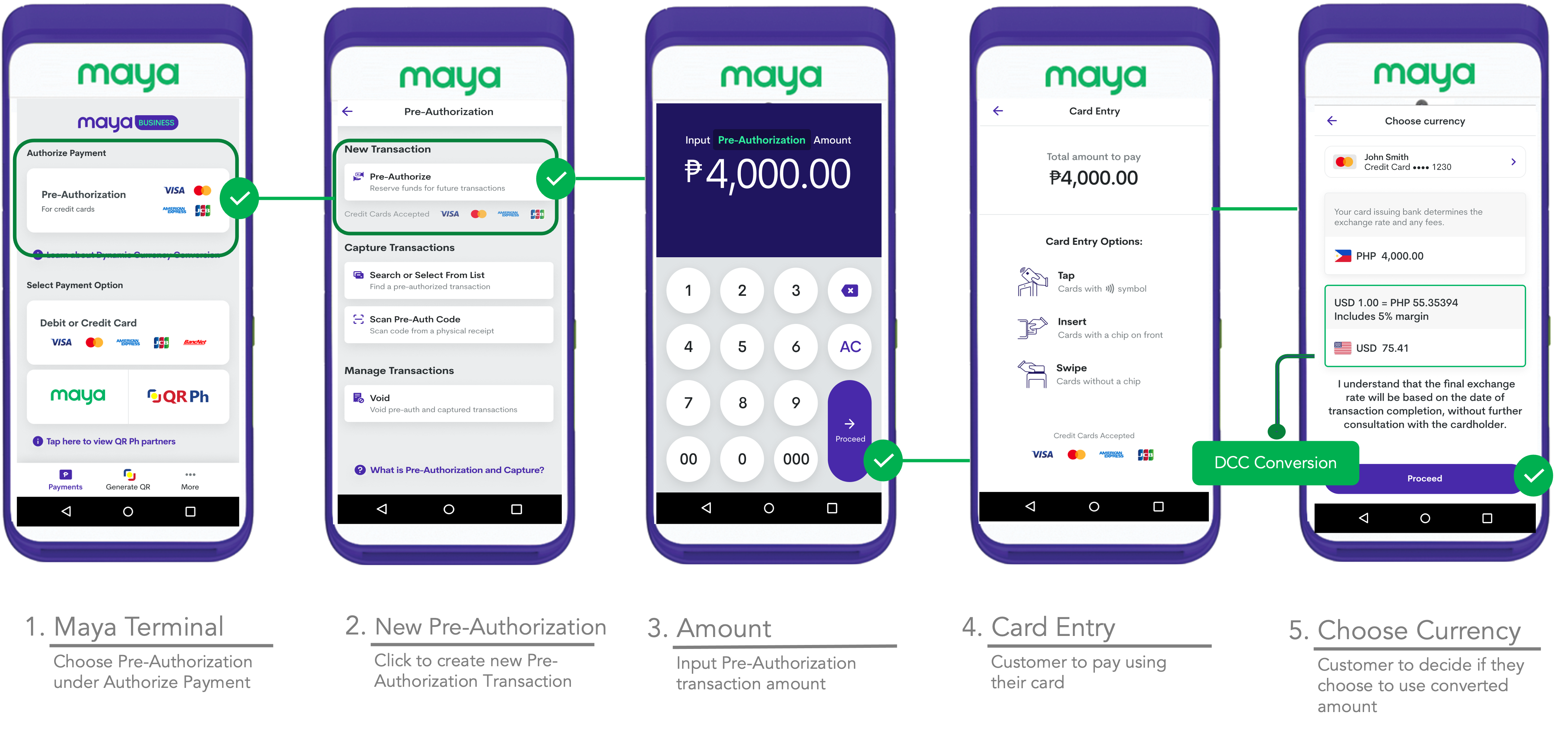
Click for more details
- On the Home page of your Maya Terminal, under “Authorize Payment”, click Pre-Authorization, and start a new transaction.
- Accept terminal payments
 . as usual, and the customer presents the card to the Maya Terminal.
. as usual, and the customer presents the card to the Maya Terminal. - The Maya terminal will recognize the country of the customer’s issued card.
- If the card’s currency differs from the merchant’s local currency, the Maya terminal will prompt the customer to choose between paying in the local currency or their own currency.
- If the customer accepts DCC by choosing the currency of their issuing card, foreign exchange conversion and the markup will be applied to the transaction. The generated receipts from Maya should include this information. If the customer opts for the merchant’s local currency, the transaction continues in the local currency.
- Follow the next Maya Terminal instructions for payment acceptance and receipt printing.
Capture the Pre-authorized DCC Transaction
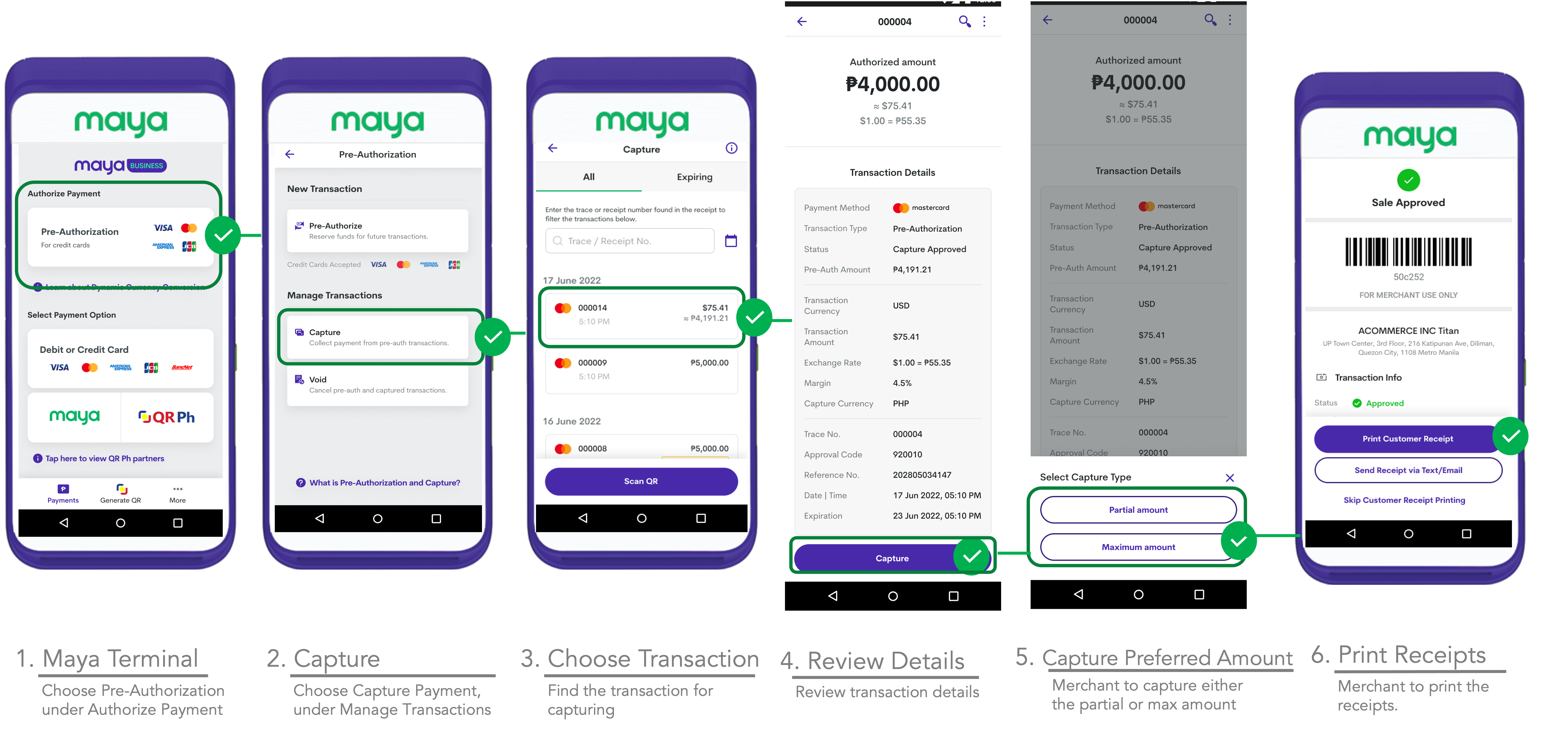
Click for more details
- Under the “Manage Transactions“ of the Pre-Authorization, click “Capture“.
- Find the transaction you want to capture.
- Review the transaction details, and click Capture.
- Choose between capturing only a Partial Amount or the Maximum Amount of the Transaction, and proceed with capturing the transaction.
Partial Amount is less than the original pre-authorized transaction amount. The releasing of the uncaptured amount back to the customer is up to the rules and processes of the customer’s issuing bank
Void and Refunds For DCC
Regulations
As part of the scheme regulations, Maya will give the customer the choice to convert a transaction into their card’s home currency, also known as Dynamic Currency Conversion (DCC), or decline and pay with the merchant’s local currency.
- No specific currency conversion method may be implemented as the default option;
- The cardholder must not be required or encouraged (i.e., “steered”) in any manner to use DCC;
- The offer must be presented in a clear and neutral manner;
- The cardholder’s choice must be honored by all entities that offer DCC; and
- The offer must comply with all applicable cardholder disclosure requirements
What if the customer does not explicitly choose to use DCC?
If the cardholder does not explicitly choose to have the transaction completed in their billing currency, it must be processed in the merchant’s local currency. DCC must NOT be selected in the cardholder’s absence.
Disclosure Requirements
Maya is fully compliant with the scheme regulations, with full disclosure of the exchange and margins, if DCC is chosen. Maya and its merchants are required to have a clear display of the following details on the screen and receipts:
- Purchase/withdrawal amount in the local and cardholder’s currency
- Amounts with both currency symbols
- The exchange rate used for the currency conversion
- Additional fees or markup assessed
Merchant Receipt
The following are illustrations of the Maya terminal options, the generated merchant receipt, and the settlement reports
Click to see the sample Merchant Receipt
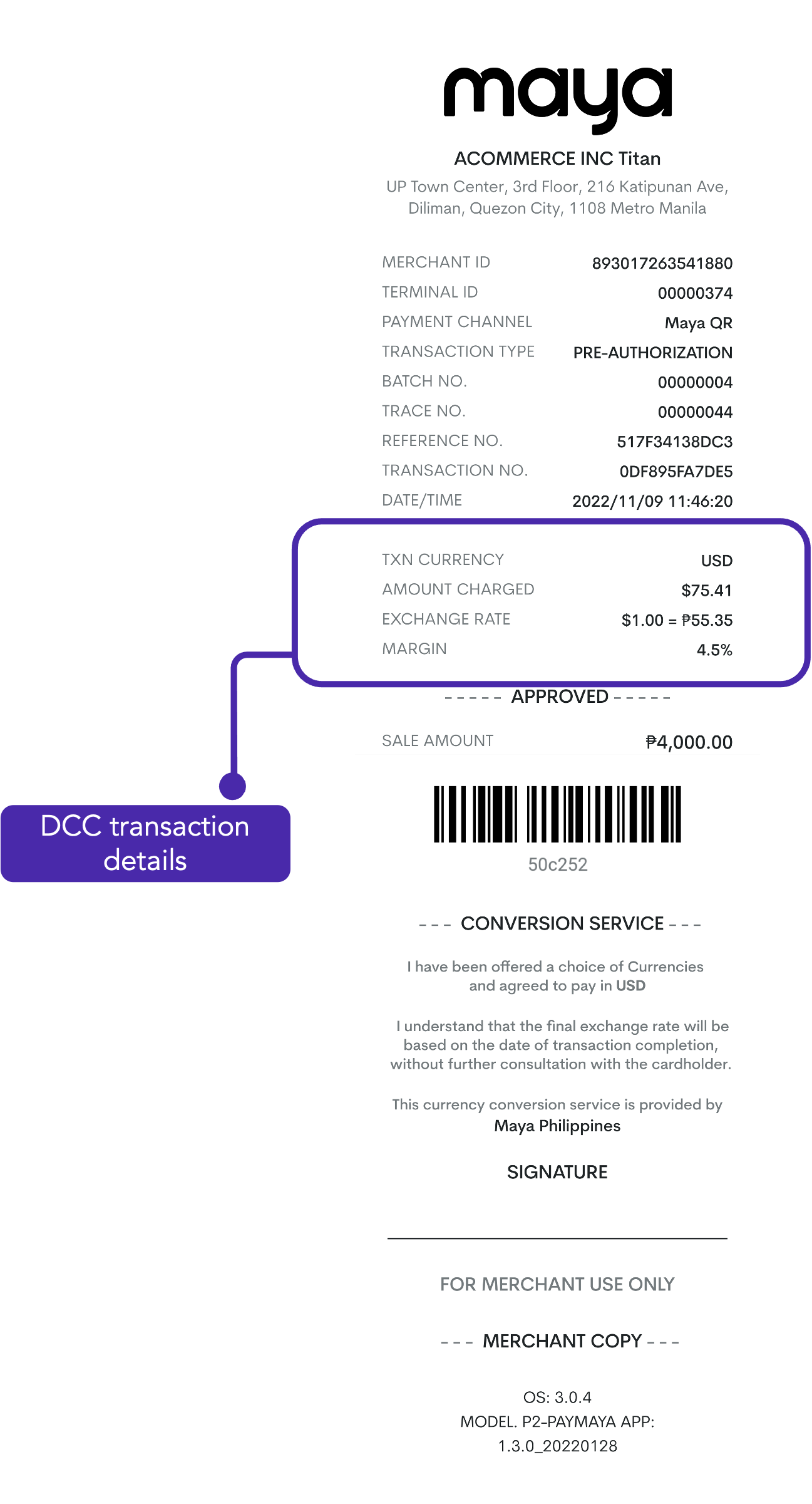
Merchant Settlement Report
When the DCC and DCC reporting is enabled, the transaction information can be found in the following reports:
- Maya Manager Statement of Account (SOA): Payment Currency, Exchange rate, DCC Offer Accept (Shows if DCC is accepted or declined)
- Maya Manager Transaction History
Customer Receipt
The image shows what the customer will receive upon printing the receipt.
Click to see the sample Customer Receipt
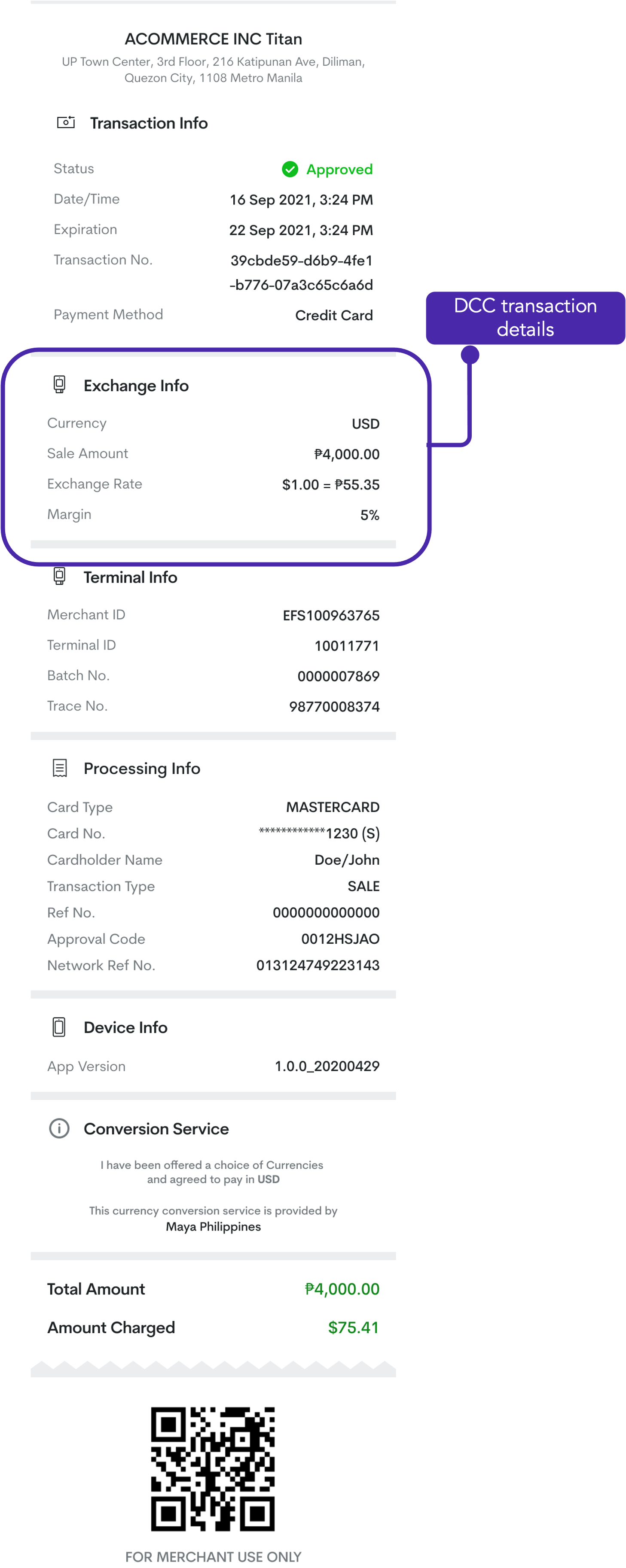
Supported Transaction Currencies
Maya supports the following DCC currencies:
Alpha Currency codes are used. There will be a record for base and transaction currencies.
- Base Merchant Currency = PHP
- Receipt Currency = USD
Click to see list of supported currencies
| Alpha Currency Code | Numeric Code | Currency Name |
|---|---|---|
| USD | 840 | US Dollar |
| CAD | 124 | Canadian Dollar |
| AUD | 36 | Australian Dollar |
| EUR | 978 | Euro |
| GBP | 826 | British Pound |
| JPY | 392 | Japanese Yen |
| INR | 356 | Indian Rupee |
| HKD | 344 | Hongkong Dollar |
| MYR | 458 | Malaysian Ringgit |
| NZD | 554 | New Zealand Dollar |
| SEK | 752 | Swedish Krona |
| SGD | 702 | Singapore Dollar |
| THB | 764 | Thai Baht |
| TWD | 901 | New Taiwan Dollar |
| CHF | 756 | Swiss Franc |
| SAR | 682 | Saudi Riyal |
| AED | 784 | United Arab Emirates Dirham |
| KRW | 410 | South Korean Won |
| NOK | 578 | Norwegian Krone |
| QAR | 634 | Qatari Riyal |
| PGK | 598 | Papua New Guinean Kina |
| DKK | 208 | Danish Krone |
| RUB | 643 | Russian Ruble |
| IDR | 360 | Indonesian Rupiah |
| KWD | 414 | Kuwaiti Dinar |
| OMR | 512 | Omani Rial |
| BND | 96 | Brunei Dollar |
| BHD | 48 | Bahraini Dinar |
| CZK | 203 | Czech Koruna |
| MOP | 446 | Macanese Pataca |
| BRL | 986 | Brazilian Real |
| PLN | 985 | Polish New Zloty |
| ZAR | 710 | South African Rand |
| LKR | 144 | Sri Lankan Rupee |
| MKD | 807 | Macedonian Denar |
| MUR | 480 | Mauritian Rupee |
| MVR | 462 | Maldivian Rufiyaa |
| MWK | 454 | Malawian Kwacha |
| MXN | 484 | Mexican Peso |
| MZN | 943 | Mozambican Metical |
| NAD | 516 | Namibian Dollar |
| NGN | 566 | Nigerian Naira |
| NPR | 524 | Nepalese Rupee |
| PAB | 590 | Panamanian Balboa |
| PEN | 604 | Peruvian Nuevo Sol |
| RON | 946 | Romanian New Leu |
| RSD | 941 | Serbian Dinar |
| TRY | 949 | New Turkish Lira |
| TTD | 780 | Trinidad and Tobago Dollar |
| TZS | 834 | Tanzanian Shilling |
| UAH | 980 | Ukrainian Hryvnia |
| UYU | 858 | Uruguayan Peso |
| XCD | 951 | East Caribbean Dollar |
| AWG | 533 | Aruban Guilder |
| BDT | 50 | Bangladeshi Taka |
| BGN | 975 | Bulgarian Lev |
| BMD | 60 | Bermudan Dollar |
| BOB | 68 | Bolivian Boliviano |
| BSD | 44 | Bahamian Dollar |
| CLP | 152 | Chilean Peso |
| CRC | 188 | Costa Rican Colon |
| DOP | 214 | Dominican Peso |
| EGP | 818 | Egyptian Pound |
| FJD | 242 | Fijian Dollar |
| GTQ | 320 | Guatemalan Quetzal |
| HNL | 340 | Honduran Lempira |
| HRK | 191 | Croatian Kuna |
| HUF | 348 | Hungarian Forint |
| ILS | 376 | New Israeli Sheqel |
| ISK | 352 | Icelandic Krona |
| JOD | 400 | Jordanian Dinar |
| KES | 404 | Kenyan Shilling |
| KYD | 136 | Cayman Islands Dollar |
| KZT | 398 | Kazakhstani Tenge |
| GIP | 292 | Gibraltar Pound |
| LBP | 422 | Lebanese Pound |
Updated over 1 year ago